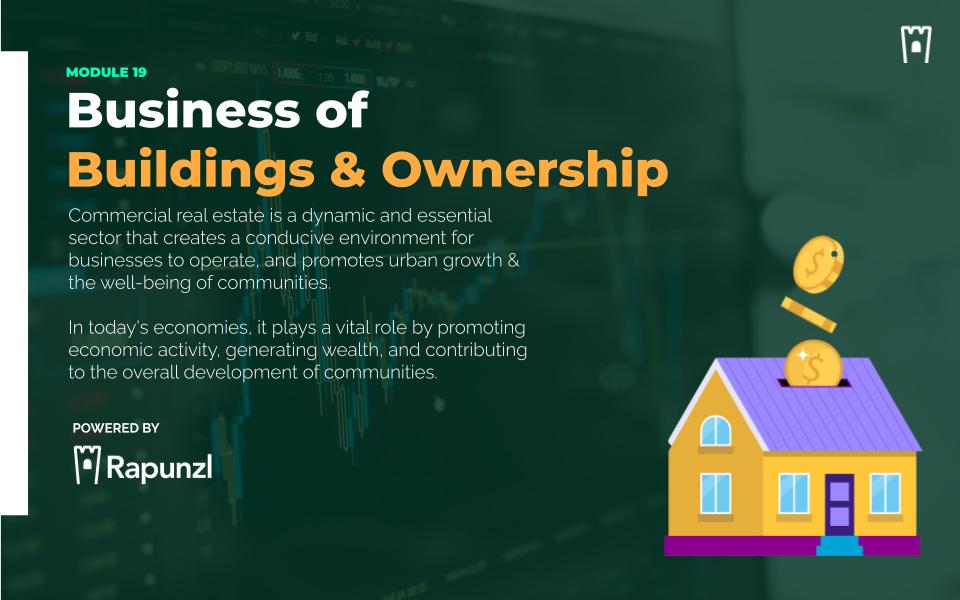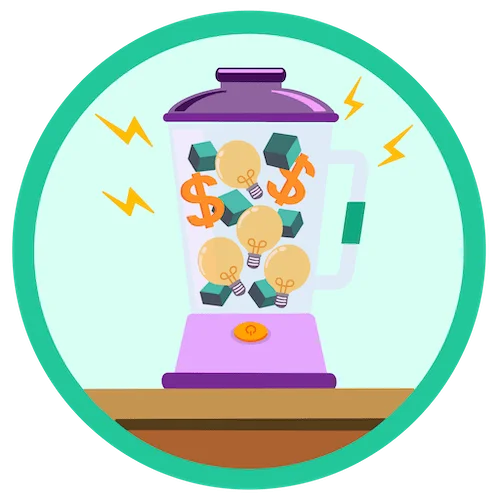
Module 19
Business Of Buildings & Ownership
This module explores how commercial real estate is a dynamic and essential sector that creates a conducive environment for businesses to operate, and promotes urban growth & the well-being of communities.
Commercial Real Estate plays a vital role in promoting economic activity, generating wealth, and contributing to the overall development of communities, so while it’s not typically covered in a financial literacy course, we have included it for interested students.
Module At A Glance
Grade Levels:
7th - 12th
Est. Length:
2-4 Hours (19 slides)
Activities:
1 Activites
Articles:
3 Articles
Languages:
English & Spanish
Curriculum Fit:
Math, Business, Economics, CTE, Social Studies
Standards Alignment:
CEE National Standards, Jump$tart National Standards & Relevant State Standards

Guiding Questions
- What is Commercial Real Estate (CRE) and why is it important?
- What is the purchase process for commercial real estate?
- What risks should you look out for when purchasing a property?
- What are appraisals and inspections? How do they play a role in CRE?
- What are homeowners and renters insurance? How are they different?
- Why would you become an investor in real estate?
Enduring Understandings
- Risks associated with CRE investments include vacancy, market, and tenant credit risks.
- Appraisals and inspections are important for determining a property's value and identifying any risks.
- Insurance is important to either a homeowner, or a renter, because anything can happen.
- There are certain tax advantages to investing in real-estate.
Module Vocab & Key Topics
Commercial Real Estate (CRE)
Real estate property that is used for business or professional purposes, typically leased from a landlord who is able to generate a profit by charging more in rent than they pay in taxes and upkeep.
Lease Terms
Lease terms are the rules and agreements between a property owner (lessor) and a renter (lessee). They cover rent, duration, responsibilities, restrictions, and other key aspects of the rental arrangement.
Due Diligence
Due diligence is a careful investigation and research process done before making important decisions. It involves gathering information, assessing risks, and understanding the pros and cons to make informed choices.
Financing
Financing involves acquiring the necessary funds to support activities or projects. This typically includes obtaining money from sources like loans, investments, or personal resources to cover expenses or pursue opportunities.
Closing
In commercial real estate (CRE), closing is the concluding stage of a property sale, signifying the official transfer of ownership from the seller to the buyer. This phase involves signing legal papers, exchanging funds, settling expenses, and updating records. Following closure, the buyer assumes ownership and control of the property.
Neighborhood Analysis
A specific type of report where real estate investors are able to calculate the expectations for a possible investment within a property.
Inspection
A rigorous and close examination of a real estate property to ensure that there are no hidden issues or causes for concern with the property.
Appraisal
This references the act in determining how much a piece of property is worth - typically conducted by a third-party that will help determine the value of a piece of property to provide assurances to both the buyer and seller.
Real Estate Investment Trusts (REITs)
REITs (Real Estate Investment Trusts) let you invest in real estate without owning property. They pool money from investors to buy properties like offices, apartments, and malls. You get dividends, they're traded on stock markets, and pros manage the properties.
Market Cycles
Market cycles are repeating patterns of economic growth and decline. They include expansion (growth), peak (high point), contraction (slowdown), and trough (low point). These cycles are influenced by factors like business activity, jobs, and consumer spending.
Economic Recession
A persistent and lasting decline in overall economic activity. Here, major and especially minor companies begin to lay off workers, leaving unemployment rates to rise.
Reduced Demand
As a result of weaker consumer confidence and a decline in purchasing, economic downturns cause demand for both residential and commercial buildings to decline.
Falling Property Values
Property values tend to diminish as a result of falling demand and waning buyer interest, which has an effect on owners' equity and market valuations as a whole.
Increased Vacancy Rates
In times of economic difficulty, businesses may downsize or close, increasing the vacancy rates in commercial properties like office buildings and retail stores.










